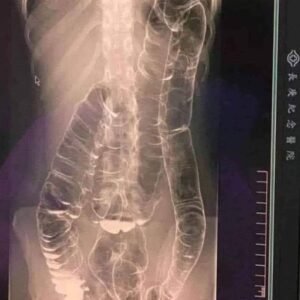While constipation may seem like a minor inconvenience, neglecting it for extended periods can lead to serious health complications. A striking real-life case highlights the dangers of chronic constipation and why it should never be ignored.
A young woman suffering from years of constipation experienced a severe decline when she went more than two weeks without a bowel movement. Concerned about her worsening symptoms, she sought medical help—only to receive alarming news.
When waste accumulates in the colon due to an inefficient digestive system, it causes severe discomfort and bloating. Over time, the colon stretches beyond its normal size, struggling to contain the excessive buildup. In this case, medical imaging revealed a dangerously distended colon that had expanded so much it reached the chest, pressing close to the heart. The stretching had nearly erased the colon’s natural folds—essential for proper function. Left untreated, this condition could have led to life-threatening complications.
The Risks of Chronic Constipation
One of the most dangerous effects of chronic constipation is severe colon distension. When the colon becomes overstretched, it loses its ability to contract effectively, making bowel movements increasingly difficult. This creates a vicious cycle where waste remains in the body even longer, further aggravating the problem.
Another serious consequence is toxin buildup. When stool lingers in the colon for too long, harmful bacteria and toxins can be reabsorbed into the bloodstream, potentially causing bloating, fatigue, bad breath, acne, and a weakened immune system.
Chronic constipation can also lead to painful conditions like hemorrhoids and anal fissures. Straining to pass hardened stool puts excessive pressure on the rectal veins, resulting in swollen, painful hemorrhoids that may bleed. In severe cases, tiny tears known as anal fissures can develop around the anus, causing sharp pain during bowel movements.
A more critical risk is bowel obstruction, where waste becomes so impacted that it completely blocks the intestines. This can cut off blood supply to parts of the gut, leading to infections and tissue death (necrosis). In life-threatening cases, emergency surgery may be required to remove the damaged sections of the intestine.
Studies have also linked chronic constipation to an increased risk of colorectal cancer. Prolonged exposure to waste in the colon can lead to chronic inflammation and abnormal cell growth, raising cancer risks over time.
Preventing and Managing Constipation
Fortunately, constipation can be prevented and managed through simple lifestyle changes:
- Increase Fiber Intake: Eating more whole grains, nuts, seeds, fruits, and vegetables supports healthy digestion. Foods like prunes, apples, pears, flaxseeds, and chia seeds act as natural laxatives.
- Stay Hydrated: Drinking at least 2-3 liters (8-12 cups) of water daily softens stools, making them easier to pass. Warm lemon water in the morning can also stimulate digestion.
- Stay Active: Regular physical activity, such as walking, yoga, or stretching for 15-30 minutes daily, stimulates the intestines and promotes regular bowel movements.
- Establish a Routine: Training the body to have a bowel movement at the same time each day—preferably after meals—can encourage regularity. Ignoring the urge to go can worsen constipation.
- Limit Processed Foods: Reducing intake of red meat, dairy, fried foods, fast food, and refined carbohydrates (like white bread and pastries) can prevent constipation.
- Try Natural Remedies: Herbal teas like peppermint, fennel, or ginger can aid digestion, while supplements such as magnesium or aloe vera juice may help regulate bowel movements.
If constipation persists for several days, monitoring diet and lifestyle habits is crucial. Seek medical attention if symptoms last longer than a week or are accompanied by severe bloating, vomiting, extreme discomfort, or blood in the stool.
Ignoring constipation can turn a minor issue into a serious health risk. By taking proactive steps to support digestive health, complications can be prevented, promoting long-term well-being. Small daily habits make a significant difference in maintaining overall health—listening to the body’s signals and adjusting accordingly is key to preventing chronic digestive issues.
